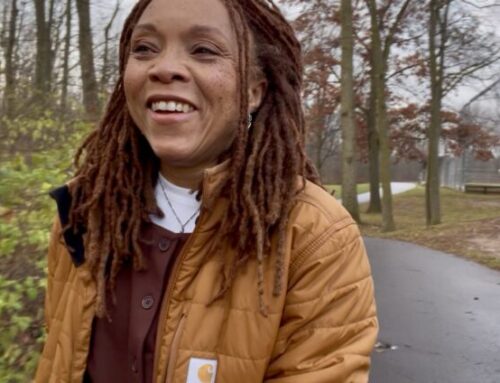“How did you get to be so strong?”
“I wish I had your strength.”
I’ve heard these comments or some variation on them many times throughout my life. The person making the comment is usually responding to how I handled a tragedy or how I got through a difficult situation that they believe would have floored them at worst, or rendered them useless at best. It’s also been pointed out to me there’s a fearlessness about my writing and how it must certainly come from a point of strength. Recently someone asked me, yet again, “the strength question” and I thought about it carefully because I wanted to give as clear an answer as possible. I came up with these two pieces:
1.) In most cases I am strong because the people I love require it of me.
2.) I am strong because often I have no choice to be otherwise. Is there really an alternative?
This answer served well in the moment, but when you consider the real reason the person was probably asking the question—they are trying to do the same or be the same way—the answer in fact fails because I didn’t tell them how to do it.
Process is important. As a teacher of writing and as a student I know I teach and learn best when I can figure out and explain the specifics of how I or another writer did something. Answering this question of strength with a basic, specific process could be the beginning of unlocking something vital for you—as a person and as a writer you will be called upon to take many emotional risks.
I’m writing about this today because lately I’ve had to deal with something that calls upon me to be my “strong” self. I recognized this immediately and I’ve been paying close attention to my process during this time so I can share with you how I’m doing it. I hope somehow this will help you find your own strength when you need it.
A friend has asked me to do something very difficult. I won’t go into the details because I want you to be able to read your own situation into this. Maybe you are terribly afraid of hospitals, but your dear friend wants you to accompany her to her chemo treatments for the next 8 weeks. Maybe you don’t like dogs but your friend is suddenly called away to care for a sick parent and you’re the only one who can take her dog for an indefinite period of time. You get the idea: you have to do something really hard, but you’re not exactly in a position to say “No.” You have to be really strong—you have to come outside of yourself to be the person your friend needs in that moment. Someone you love requires it, and you really have no choice. How are you going to get through it?
My process begins and ends with love. I don’t mean you simply think, “I love this person so of course I’ll do it.” That thought might get you started—it’s even what makes you say, “Yes” to your friend’s request. But in the thick of battle your first thought will soon become, “Why am I putting myself through this?” You might keep going but you won’t be strong and your friendship will suffer for it.
I mean you have to sit down and do the specific work of stoking the embers of your friendship’s love. I make myself actively feel why I love this person. Here’s how I do it. I have a mind that responds to repetition. I will go through photographs, re-read e-mails and letters (yes, for close friends, I have such things on hand) and I run through my head, like a movie, memorable loving times we’ve had together. My motivation, strength and faith rise to the surface.
It’s funny, but I really think my learning in this began from watching soap operas. It used to perplex me how the show would feature this loving super couple who had endured landslides, kidnappings, aliens, you name it. They would survive and get married, but the moment a possible rival appeared all the stuff they went through went out the window and a person would start fretting they’d lose their spouse. Their mind was too busy processing misleading signals in the present moment. If they had allowed their heart to guide them, they would have been grounded, comforted and confident based on all the loving acts that served as their relationship’s hard-built foundation.
The same foundation exists for friendships—if this is a close friend, someone you love, I’m assuming your friendship is built on a significant foundation of words, actions and memories that made you cherish the person in the first place. That stuff doesn’t go away. It’s in the “emotional bank,” as Stephen Covey called it in The Seven Habits of Highly Effective People. A close friend will have made many, many deposits.
 Your recalling the foundation of your friendship is kind of like what the participants do to get ready to walk over the hot coals at a Tony Robbins event. You want to get the heart pumping, the blood flowing and you psyche yourself up so you can do anything, including walking over hot coals without getting burned. I’m doing this now: I’m immersing myself in the love. It’s both a coat of protection and the thing that takes the focus off my fears and me and puts it firmly on my friend to the point where I’m willing to shoot myself out of a rocket for him or her. My thoughts are now, “I will do this because that’s how important my friend is; this is how much this friendship means to me. I believe in my friend.”
Your recalling the foundation of your friendship is kind of like what the participants do to get ready to walk over the hot coals at a Tony Robbins event. You want to get the heart pumping, the blood flowing and you psyche yourself up so you can do anything, including walking over hot coals without getting burned. I’m doing this now: I’m immersing myself in the love. It’s both a coat of protection and the thing that takes the focus off my fears and me and puts it firmly on my friend to the point where I’m willing to shoot myself out of a rocket for him or her. My thoughts are now, “I will do this because that’s how important my friend is; this is how much this friendship means to me. I believe in my friend.”
So I, or you, do the thing, whatever it is. And you get through it.
That’s when the questions from others begin: “How could you be so strong? Weren’t you afraid?”
By then, when it’s all over, you probably won’t even remember you asked this yourself at one point. You shrug your shoulders—you only did what you had to do.



